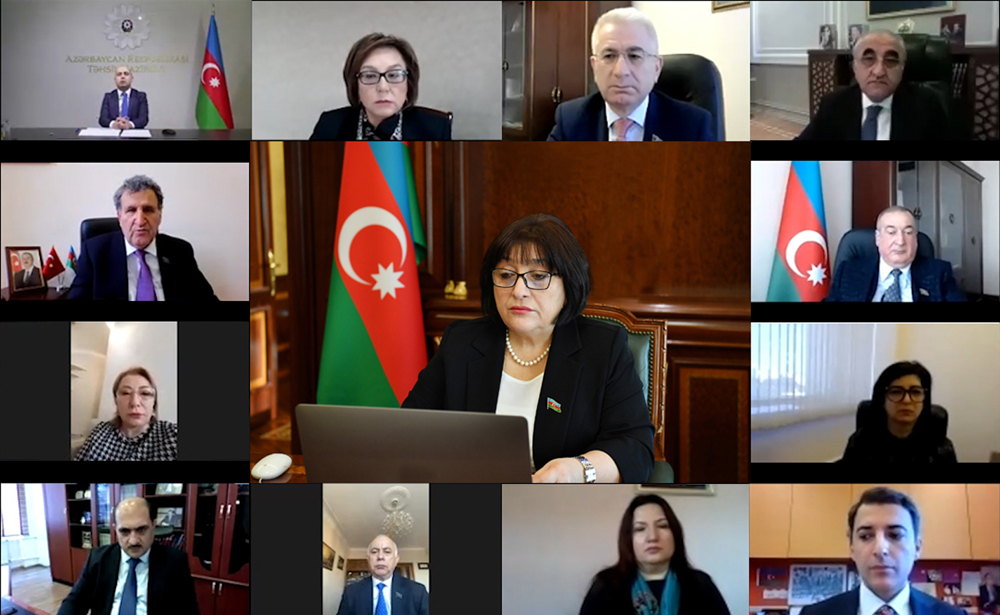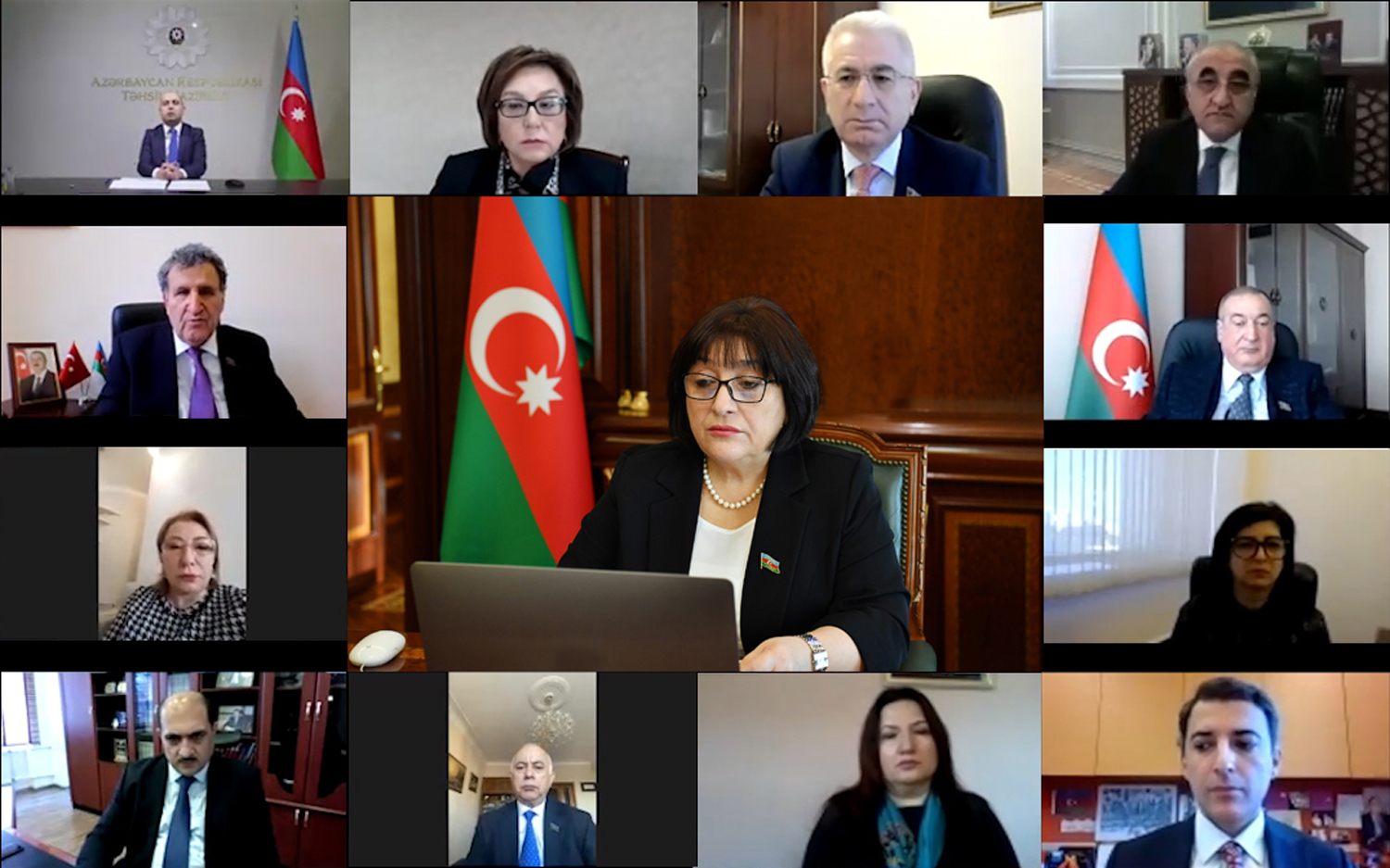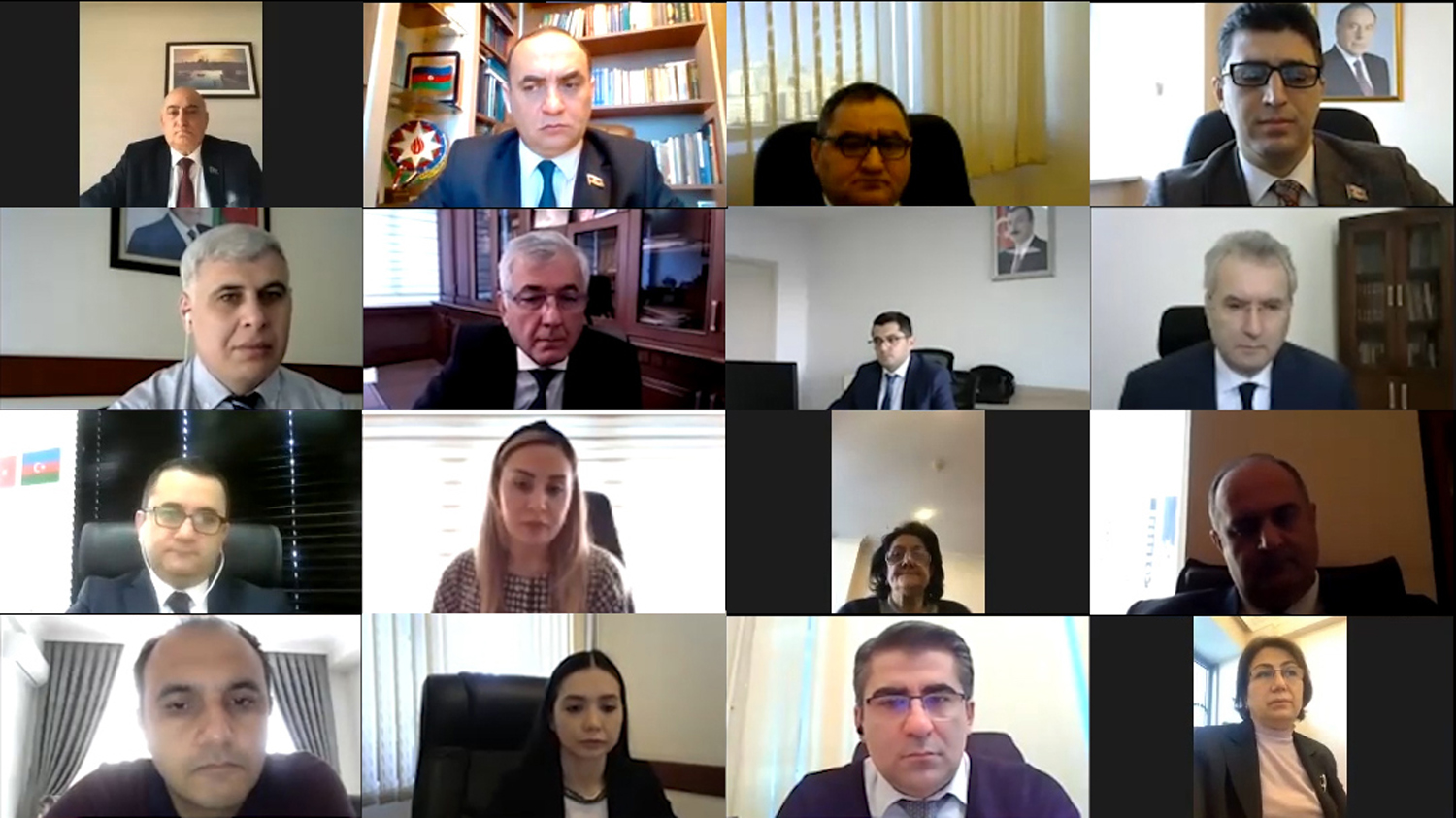A Videoconference on Drafting Tertiary Education Bill is Held at the Milli Majlis

The Working Group on the Tertiary Education Bill held a videoconference on 22 January at the suggestion of Chair of the Milli Majlis Sahiba Gafarova. The online meeting went with the participation of the Minister of Education of the Azerbaijan Republic Emin Amrullayev, Chair of the Board of Directors of the Public Corporation ‘State Examinations Centre’ Maleyka Abbaszade, members of the Milli Majlis Sciences and Education Committee, delegates of the concerned government departments, university rectors and experts.
Chair Gafarova opened the meeting by welcoming the participants. Her introductory speech was about the results of the internal and external policy pursued under the guidance of President Ilham Aliyev during 2020 and about the future plans. Madame Speaker recalled the web conference presided over by the Head of State and held on 6 January to sum up on last year; at that meeting, Mr President assayed the outcomes of 2020 thoroughly and in a conceptual manner, and defined the tasks lying ahead.
Mrs Gafarova mentioned the historic victory in the Patriotic War that de-occupying of our lands and restoring the territorial integrity of the country, saying it was the topmost highlight of the gone year. She congratulated the assembly on the remarkable victory which, she added, had been brought to us by the generalship and sublime leading skills of President and Commander-in-Chief Ilham Aliyev and by the heroism of our glorious Army. It will live in the history of our nation forever.
While the coronavirus pandemic made all the countries of the world face problems during 2020, Azerbaijan passed that trial with small harm relative to certain countries. The purposeful reforms under way in the country made certain that some economic sectors manifested growth during the year whilst the furtherance of the political reforms including the structural and personnel-related ones set in motion a qualitatively new stage in the democratic advancement of the country, according to Mrs Gafarova.
The extraordinary parliamentary election of last year brought forth a new composition of the Milli Majlis. The Parliament supports, within its responsibility area, the targeted and pragmatic internal and external policy unfolding under the leadership of President Ilham Aliyev and had done a serious kind of work to that end. As the Patriotic War raged on, the Milli Majlis used every opportunity provided by parliamentary diplomacy to tell the global community of Azerbaijan’s just cause without failing to keep the international audiences aware of the provocations of Armenia. Besides, there were the steps taken to make the legislative authority yet more efficient and to ensure its work went on in line with the requirements of the day.
Speaking further, Madame Speaker mentioned the purposeful work done in the education field, too, be it in the realm’s organisation or in conduct of admission exams, despite the difficulties posed by the pandemic. As a consequence, both areas’ agendas had been fulfilled due to the special care and attention of the Head of State and, at the same time, because of the professionalism put in the arranging the work in the education sector.
Having emphasised the critically important role of education in the progress of any state and any society, Mrs Gafarova mentioned its fair depiction as the basis for accumulation of knowledge and as the driver behind progress. It could safely be said, she added, that the progress of education was given the top-level attention in Azerbaijan. The well-targeted policy and tenacious activities had given birth to remarkable achievements in this sector. The esteemed President Ilham Aliyev declared the education sector and the upbringing of the patriotic youth with a modern world outlook amongst the paramount goals of the state policy. Also, he has taken tremendous steps to that end exactly. A serious kind of work was done to modernise the educational infrastructure, too: thousands of secondary schools have been built or refurbished over the 15 years past, which has secured the high-standard resolution of the educational infrastructure-related issues.
Madame Chair proceeded to refer to the diverse programmes implemented with a view to accelerating integration processes in the education sector and training professional and literate human resources. The efforts made with this purpose in mind formed a powerful educational system up to the modern challenges in Azerbaijan. It should be underlined, too, that the Heydar Aliyev Foundation led by First Vice President of the Azerbaijan Republic Mrs Mehriban Aliyeva played a central part in all those efforts and projects; it did a hugely important kind of work, and proposed and carried into life various initiatives.
The country made successful moves towards building the legislative basics for educational reforms and strengthening the legal frameworks of the sector, whilst the Milli Majlis drew up and passed a number of relevant laws.
The State Strategy of Education Development in the Azerbaijan Republic drafted at the suggestion of President Ilham Aliyev and signed off by him in 2013 marked the beginning of a new era in the on-going education reforms. Azerbaijan is implementing persistent reforms in conformity with the said strategy and with reliance on the modern international educational standards in order to heighten the quality of education. Amongst those reforms one could mention the systemic moves and modifications in the tertiary education that improved it considerably. And yet, the times change quickly and new requirements appear consequently. The accelerated and continuous progress of Azerbaijan has created a new kind of reality in all the areas and, naturally, the new realia and the study of the existing international experience imply the necessity of radical reorganisations in the education field as much as they do the need to strengthen its legislative foundation in the country, as Mrs Gafarova pointed out.
Considering all that, the State Programme of Enhancing the International Competitiveness of the Tertiary Education System of the Azerbaijan Republic in 2019-2023 enacted by the venerable President Ilham Aliyev is viewed as a means of setting new and higher standards in tertiary education. That programme envisages both greater contents and higher qualitative parameters anchored in the international dual-diploma programmes and employing overseas specialists, and training academic personnel based on overseas doctorate programmes. The tertiary education facilities must be transformed into modern academic research and innovation hubs aspiring to higher international ratings. Research universities should be established and professional, innovative staff be educated with a view to market demands therefore.
The study of the existing pertaining legislation demonstrates its insufficiency despite even the relevant state programmes already implemented to speed up the integration of the local tertiary education with the European counterpart space and the effective addenda and amendments to the Education Law notwithstanding. The tertiary education matters are only covered in one article of the Education Law in the main and very briefly, too; rather, they are governed by other regulatory legal instruments whereas they ought to be governed by a law, in no small part because the international conventions that Azerbaijan has joined so require. The first ever Tertiary Education Law of the country is to be drawn up consequently; there has not been such a law before, according to Mrs Gafarova.
Madame Chair went further to say that 2021 was not to be just another calendar year to us but that we had started a new stage in the lives of both the state and the people of Azerbaijan because the victory gained in the Patriotic War and the de-occupation of our lands had generated new prospects for the country but had also set new challenges before it. The age of creation has come. Speaking at the 2020 summary meeting mentioned earlier, Mr President stated the action and the tasks to attend to next with abundant clarity.
‘I trust,’ Mrs Gafarova continued, ‘that the task’s performance will assist in the successful and confident advancement of Azerbaijan. Mr President said confidently that the academic community of our country would do its share of the creation tasks with distinction as its contribution to the on-going progress of Azerbaijan.’
Closing her speech, Madame Chair expressed a belief that the meeting today would see discussions and valuable proposals regarding the existing education achievements and other relevant aspects as well as in respect to the intended drafting and enactment of the Tertiary Education Law.
The next speaker, who was Chairman of the Milli Majlis Sciences and Education Committee and Leader of the Work Group Bakhtiyar Aliyev, said that that was the first meeting of the Group, called to hear education experts’ opinions and draw up the Tertiary Education Bill on their basis.
‘We have studied a number of international conventions, the international documents which our country has joined as well as the national legislation and the labour market in this connexion. The first draft of the Bill will be based on the ideas that are going to be voiced today; this draft will be tabled at the next meeting of the Working Group. Thorough deliberations will follow the finalised Bill’s submission to the Committee. Next, the Bill is to be cleared for the tabling at a plenary sitting of the Milli Majlis,’ Mr Aliyev said.
Minister of Education Emin Amrullayev who spoke then stressed that, as a task of utmost importance to the education system of Azerbaijan, the drafting of the Tertiary Education Bill required extensive deliberations. He spoke of the 51 tertiary education institutions in the country: 20 of them are subordinated to the Ministry of Education, 13 are under the auspices of other ministries and certain committees, 11 are private institutions and 7 are special-purpose facilities.
The Minister also informed the meeting participants of the chief articles of the future Bill, and shared his thoughts about the education system players, the accessibility of tertiary education, the quality and efficiency of the education, the existing tertiary education financing mechanisms, the tertiary education administration process and the education system’s classification in accordance with the international standards. Mr Amrullayev also brought up the subjects of scholarship allowances, student’s loans, the process of education and upbringing, the economics of education, quality control in education, forms of education and what matters must be put in the new draft law.
After that, Mrs Abbaszade put forth her proposals concerning university student enrolment and the general enrolment rules. The SEC Chair made references to international examinations, the internationalisation of tertiary education and education efficiency assessment at universities. In addition, she commented on lowering the enrolment exam pass grades, planning the enrolment of more students and other matters. Mrs Abbaszade emphasised the importance of unpacking certain terms to be used in the new draft law and touched on the subject of statistical data in student enrolment.
The members of the parliamentary committee for Sciences and Education Isa Habibbayli, Musa Gasimli, Jeyhun Mammadov, Etibar Aliyev, Anar Iskandarov, Kamila Aliyeva, Shahin Seyidzade, Aghiya Nakhchivanli and Parvin Karimzade as well as the Rector of the State Economics University of Azerbaijan Adalat Muradov spoke during the meeting. They all set forth their thoughts and suggestions concerning the Bill in the making as well as about remote education, the training of the academic staff, the role of the national spiritual values in education and the relevant matters.
Summing the videoconference up, Bakhtiyar Aliyev said there had been a very interesting and fruitful discussion about the public concerns. The Tertiary Education Bill to be based on the considerations voiced today would be discussed comprehensively at the next Working Group meeting, Mr Aliyev promised.
With that, the online meeting of the Working Group on the Tertiary Education Bill came to a close.
The Press and Public Relations Department
The Milli Majlis





